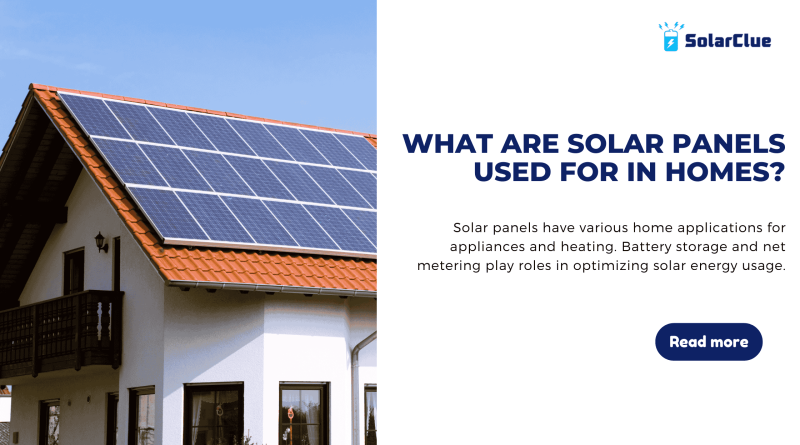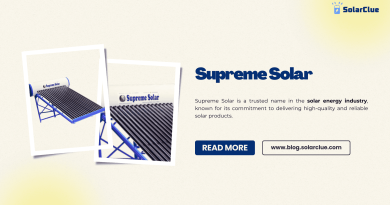What Are Solar Panels Used For In Homes?
Solar panels are becoming increasingly popular in residential settings as homeowners look for sustainable ways to reduce energy costs and minimize their environmental impact. This blog will explore various applications of solar panels in the home, covering essential appliances, heating, and more. We will also discuss the roles of battery storage and net metering in maximizing solar energy utilization.
Table of Contents
- 1 Solar Panels for Powering Essential Appliances
- 1.1 Using Solar Energy for Heating Water and Space Heating
- 1.2 Solar Panels for Powering Home Offices and Entertainment Systems
- 1.3 The Role of Battery Storage in Optimizing Solar Energy Usage
- 1.4 Net Metering and Selling Excess Electricity Back to the Grid
- 1.5 Solar Panels and Electric Vehicles
- 1.6 The Impact of Solar Power on Home Energy Efficiency
- 1.7 Future Applications of Solar Panels in Homes
- 1.8 Addressing Common Concerns and Misconceptions about Solar Panel Usage
- 1.9 Summary of Solar Applications in Residential Settings
- 1.10 Conclusion
- 1.11 FAQs
Solar Panels for Powering Essential Appliances
Solar panels can be effectively used to power essential household appliances, helping reduce electricity bills and increase energy independence:
- Lights: Solar panels can provide reliable power for indoor and outdoor lighting, reducing the need for grid electricity.
- Refrigerators: Running refrigerators on solar power ensures food preservation without interruption, even during power outages.
- Televisions and Entertainment Systems: Solar energy can easily power televisions, sound systems, and other entertainment devices.
Using Solar Energy for Heating Water and Space Heating
Solar energy is also a viable option for heating purposes in the home:
- Solar Water Heaters: Solar water heaters use the sun’s energy to heat water, significantly reducing the need for electric or gas water heaters.
- Space Heating: Solar panels can power electric heaters or be integrated into systems that provide radiant floor heating, enhancing home comfort in an eco-friendly way.
Solar Panels for Powering Home Offices and Entertainment Systems
With more people working from home, solar panels are ideal for ensuring a stable and cost-effective power supply:
- Home Offices: Solar power can run computers, printers, and other office equipment, reducing the operational costs of a home office.
- Entertainment Systems: Keep your entertainment systems running smoothly with solar energy, whether it’s a gaming console, streaming device, or home theater system.
The Role of Battery Storage in Optimizing Solar Energy Usage
Battery storage is a critical component of a solar energy system, allowing homeowners to store excess energy for use when the sun isn’t shining:
- Energy Independence: Batteries provide power during nighttime or cloudy days, reducing reliance on the grid.
- Load Shifting: Store energy during off-peak hours and use it during peak times, when electricity rates are higher.
- Backup Power: In case of a grid outage, battery storage ensures that critical appliances and systems continue to operate.
Net Metering and Selling Excess Electricity Back to the Grid
Net metering is a system that allows homeowners to sell excess solar energy back to the grid:
- How Net Metering Works: When your solar panels generate more energy than you use, the excess is sent to the grid, and you receive credits on your electricity bill.
- Financial Benefits: Net metering can significantly reduce or even eliminate electricity bills, depending on the size of your solar system and energy usage.
- Grid Stability: By contributing to the grid, solar-powered homes help stabilize the overall energy system, particularly during peak demand times.
Solar Panels and Electric Vehicles
Solar panels can be used to power electric vehicles (EVs), offering a complete renewable energy solution:
- EV Charging Stations: Install a home charging station powered by solar panels to reduce the cost of running your electric vehicle.
- Sustainable Transportation: Combining solar energy with electric vehicles reduces your carbon footprint and increases energy independence.
The Impact of Solar Power on Home Energy Efficiency
Solar panels contribute to overall home energy efficiency in several ways:
- Reduced Energy Losses: Solar energy systems, especially when combined with battery storage, minimize energy losses compared to traditional grid systems.
- Energy Efficiency Upgrades: Installing solar panels often goes hand-in-hand with other energy efficiency improvements, such as better insulation and energy-efficient appliances.
Future Applications of Solar Panels in Homes
The future holds exciting possibilities for solar energy in residential settings:
- Solar-Powered Smart Homes: Integration with smart home technologies allows for more efficient energy management.
- Advanced Solar Technologies: Innovations like solar roof tiles and transparent solar panels for windows will further expand the applications of solar energy in homes.
- Community Solar Projects: Homeowners without suitable roofs can participate in community solar projects, benefiting from solar energy without direct installation.
Addressing Common Concerns and Misconceptions about Solar Panel Usage
Despite the benefits, some homeowners may have concerns about adopting solar energy:
- Initial Costs: While the upfront cost of solar panels can be high, government incentives, rebates, and financing options can make solar energy more accessible.
- Maintenance Requirements: Solar panels require minimal maintenance, typically limited to occasional cleaning and inspection.
- Aesthetic Impact: Modern solar panels are designed to be low-profile and can be integrated into various roofing styles without detracting from a home’s appearance.
Summary of Solar Applications in Residential Settings
| Application | Description | Benefits |
|---|---|---|
| Powering Essential Appliances | Lights, refrigerators, TVs, etc. | Reduced electricity bills, energy independence |
| Water and Space Heating | Solar water heaters, radiant floor heating | Lower heating costs, eco-friendly heating |
| Home Offices and Entertainment | Computers, printers, entertainment systems | Stable power supply, cost savings |
| Battery Storage | Storing excess energy for later use | Energy independence, backup power |
| Net Metering | Selling excess electricity back to the grid | Financial savings, grid stability |
| Electric Vehicle Charging | Charging EVs with solar energy | Reduced transportation costs, sustainability |
| Energy Efficiency | Reduced energy losses, energy-efficient upgrades | Increased home energy efficiency |
Conclusion
Solar panels offer numerous applications in residential settings, from powering essential appliances to charging electric vehicles. By integrating battery storage and taking advantage of net metering, homeowners can maximize the benefits of solar energy, reducing their environmental impact and electricity costs. As technology advances, the potential for solar energy in homes will only continue to grow, making it a wise investment for the future.
Here at SolarClue®, we offer a smart, practical, and “beautiful” solution. You will be answered for all the questions related to Solar.
We provide all kinds of brands that are the Best Solar panels in India.
If you are the one who is planning for the solar power system. Don’t hesitate to contact our team!
Looking forward to empowering you with solar energy, just like hundreds of our other clients!
FAQs
1. How much can I save on electricity bills with solar panels?
The savings depend on your energy usage, system size, and local electricity rates, but many homeowners see a significant reduction, with some eliminating their electricity bills entirely through net metering.
2. Is my roof suitable for solar panels?
The suitability depends on factors like roof orientation, pitch, and shading. A professional assessment can determine if your roof is ideal for solar installation.
3. What is the lifespan of solar panels?
Most solar panels have a lifespan of 25 to 30 years, with performance warranties typically guaranteeing at least 80% efficiency after 25 years.
4. How does net metering benefit me?
A: Net metering allows you to earn credits for excess electricity generated by your solar panels, which can offset future electricity costs.
5. Can I use solar panels during a power outage?
A: If your system includes battery storage, you can use stored solar energy during an outage. Without batteries, solar panels typically cannot provide power during an outage due to safety regulations.




